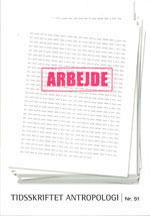SØMANDSKAB: Arbejdsidentitet og sikkerhedsregler hos danske sømænd
DOI:
https://doi.org/10.7146/ta.v0i51.106700Abstract
Efforts to reduce accidents in seafaring have recently resulted in a proliferation of
measures such as workplace assessments and checklists. Unfortunately, the demand
for written procedures is perceived by many seafarers as counteracting the use of common
sense, experience and professional knowledge epitomized in the concept of seamanship.
“Seamanship” fits well with Dreyfus and Dreyfus’ model of skill acquisition: While
novices steadily follow context-independent rules, context and experience become
predominant at the expert level. In contrast to the novice, expert behaviour goes beyond
analytical rationality and is situational, experience-based, and intuitive. The Aristotelian
concept of phronesis adds a reflexive, social and ethical dimension to expert knowledge.
Phronesis is, like expertise, contextual, experience-based knowledge; but it is also
value- and action-oriented. It combines the capacity to recognize what ought to be
done with the ability to do it. While phronesis rests on value rationality, “techne”
(know how), another Aristotelian concept, is based on instrumental rationality and is
production-oriented. Phronesis is, inter alia, choosing the proper techne for the circumstances.
The seamen fear a development where techne predominates at the expanse of
phronesis. The case raises several issues on which conditions and contexts are
appropriate for rules and procedures to be perceived as a tool at the service of phronesis.
Downloads
Published
How to Cite
Issue
Section
License
Ophavsretten til artiklerne i Tidsskriftet Antropologi tilfalder forfatteren.
Artikler publiceret i Tidsskriftet Antropologi må citeres, downloades og videresendes for ikke-kommerciel brug, under forudsætning af normal akademisk reference til forfatter(e) samt tidsskrift, årgang, nummer og sider. Artiklerne må kun genudgives med eksplicit tilladelse fra forfatter(e) og tidsskriftet.


